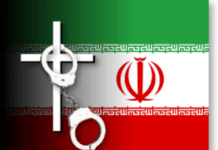(Initial reports said the four men could be facing the court Monday, September 4. The Church of Iran says the real date is October 4. A corrected version follows).
By BosNewsLife Middle East Service
 TEHRAN,IRAN (BosNewsLife)– An Iranian judge known for his harsh sentences will supervise the appeal hearing launched by a well-known pastor and three other Iranian Christians against their long prison sentences for what authorities consider dangerous Christian activities, BosNewsLife learned Friday, September 1.
TEHRAN,IRAN (BosNewsLife)– An Iranian judge known for his harsh sentences will supervise the appeal hearing launched by a well-known pastor and three other Iranian Christians against their long prison sentences for what authorities consider dangerous Christian activities, BosNewsLife learned Friday, September 1.
Evangelical Pastor Yousef Nadarkhani along with the other devoted Christians Mohammadreza Omidi, Yasser Mossayebzadeh, and Saheb Fadaie was expected to face the court October 4.
Christians with close knowledge about the situation said the four Iranian believers would meet Judge Ahmad Zargar, head of the 36th Branch of the Tehran Appeals Court. Advocacy group Christian Solidarity Worldwide (CSW) said that “Judge Zargar…was among several Iranian officials deemed responsible or complicit
in serious human rights violations in 2012.”
He was also one of six judges accused in 2014 of “having lost judicial impartiality and overseeing miscarriages of justice in trials involving journalists, lawyers, political activists and members of Iran’s ethnic and religious minorities,” CSW added.
His name is currently among those targeted for financial sanctions by Britain, the group explained.
CHURCH OF IRAN
News that the judge will oversee the appeals hearing came as a setback for the four Christians who belong to the Church of Iran denomination, one of the largest house church movements in the Islamic nation.
In July 2017, the head judge of the 26th Branch of the Islamic Revolutionary Court in Tehran, Judge Ahmadzadeh, found them guilty of ‘acting against national security’ by ‘promoting Zionist Christianity,’ and sentenced them to 10 years imprisonment each.
Pastor Nadarkhani, who earlier faced the death penalty for refusing to abandon Islam but was later released, and Omidi also received additional two-year sentences, to be served in what critics have called “an inhospitable area” in the south of the country.
All four men were detained in May last year during a series of raids by security agents on Christian homes in the coastal city of Rasht
and charged with ‘acting against national security.’
Mossayebzadeh, Fadaie, and Omidi are also awaiting the outcome of their appeal against a sentence of 80 lashes each that was handed down in 2016, following their conviction for drinking wine during a communion service.
NATIONAL SECURITY CHARGES
CSW’s Chief Executive Mervyn Thomas told BosNewsLife that the “national security charges leveled against these men were spurious, and their sentences are excessive, amounting to a criminalization of Christian practice.”
He said that he hopes the appeal court judge will still rule by “the law and overturn the original verdict in the interests of justice,” but he added that “we have grave concerns about the judge who has been selected to hear the case.”
Thomas said that CSW has also called for an annulment of the conviction of Omidi, Mossayebzadeh, and Fadaie for drinking wine during a communion service as this “penalizes the observance of one of the most important Christian sacraments and violates the constitutional recognition of Christianity.”
Christians say the period preceding and following Iranian President Hassan Rouhani re-election saw a steep rise in the number of Christians found guilty on what they call vaguely-defined national security-related crimes for which they receive heavy sentences.
Standard charges include ‘acting against national security,’ ‘insulting the sacred’ and ‘propaganda against the State.’
MANY CHRISTIANS SENTENCED
So far Judge Ahmadzadeh has sentenced at least 16 Christians to between five and ten years imprisonment, with one receiving a 15-year sentence, according to records compiled by Article 18, a group advocating on behalf of Iranian Christians.
Previously, the maximum penalty issued for these unauthorized Christian activities was five years, experts said.
“When defendants received two five-year sentences, the maximum sentence issued in such cases was five years, and when defendants received two five-year sentences, these were reduced to five years on appeal,” CSW observed.
Iranian authorities have defended their policies in the strict Islamic nation.
(With reports from the region and BosNewsLife’s Stefan J. Bos)








